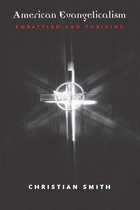
Based on a national telephone survey and more than three hundred personal interviews with evangelicals and other churchgoing Protestants, this study provides a detailed analysis of the commitments, beliefs, concerns, and practices of this thriving group. Examining how evangelicals interact with and attempt to influence secular society, this book argues that traditional, orthodox evangelicalism endures not despite, but precisely because of, the challenges and structures of our modern pluralistic environment. This work also looks beyond evangelicalism to explore more broadly the problems of traditional religious belief and practice in the modern world.
With its impressive empirical evidence, innovative theory, and substantive conclusions, American Evangelicalism will provoke lively debate over the state of religious practice in contemporary America.
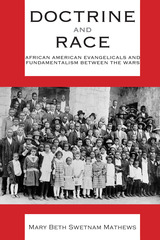
By presenting African American Protestantism in the context of white Protestant fundamentalism, Doctrine and Race: African American Evangelicals and Fundamentalism between the Wars demonstrates that African American Protestants were acutely aware of the manner in which white Christianity operated and how they could use that knowledge to justify social change. Mary Beth Swetnam Mathews’s study scrutinizes how white fundamentalists wrote blacks out of their definition of fundamentalism and how blacks constructed a definition of Christianity that had, at its core, an intrinsic belief in racial equality. In doing so, this volume challenges the prevailing scholarly argument that fundamentalism was either a doctrinal debate or an antimodernist force. Instead, it was a constantly shifting set of priorities for different groups at different times.
A number of African American theologians and clergy identified with many of the doctrinal tenets of the fundamentalism of their white counterparts, but African Americans were excluded from full fellowship with the fundamentalists because of their race. Moreover, these scholars and pastors did not limit themselves to traditional evangelical doctrine but embraced progressive theological concepts, such as the Social Gospel, to help them achieve racial equality. Nonetheless, they identified other forward-looking theological views, such as modernism, as threats to “true” Christianity.
Mathews demonstrates that, although traditional portraits of “the black church” have provided the illusion of a singular unified organization, black evangelical leaders debated passionately among themselves as they sought to preserve select aspects of the culture around them while rejecting others. The picture that emerges from this research creates a richer, more profound understanding of African American denominations as they struggled to contend with a white American society that saw them as inferior.
Doctrine and Race melds American religious history and race studies in innovative and compelling ways, highlighting the remarkable and rich complexity that attended to the development of African American Protestant movements.
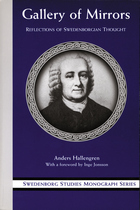
What is the "secret of Great Tartary"? What became of the Swedish clerk Carl Robsahm's original manuscript of his talks with Emanuel Swedenborg? What was Strindberg's reaction to Balzac's novel Seraphita?
These and other provocative questions are answered by Anders Hallengren in a selection of essays. Hallengren's research in various parts of the world brings to light records that were formerly thought to be lost. In addition, Hallengren traces routes of subtle influence that range from the experiences of Swedish soldiers captured in Russia to a chance encounter in a hotel in Charlotte Amalie, St. Thomas, in the Virgin Islands. Hallengren argues that these influences show the profound effect of Swedenborgian thought on celebrated and ordinary people, resulting not only in profound art but in a better world.
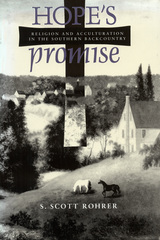
In Hope's Promise, Scott Rohrer dissects the internal workings of the ecumenical Moravian movement at Wachovia—how this disparate group of pilgrims hailing from many countries (Germany, Ireland, Scandinavia, England) and different denominations (Lutheran, Reformed, Methodist, Anglican) yielded their ethnicities as they became, above all, a people of faith. By examining the "open" farm congregations of Hope, Friedberg, and Friedland, Rohrer offers a sensitive portrayal of their evangelical life and the momentous cultural changes it wrought: the organization of tight-knit congregations bound by "heart religion;" the theology of the new birth; the shape of religious discipline; the sacrament of communion; and the role of music. Drawing on courthouse documents and church records, Rohrer carefully demonstrates how various groups began to take on traits of the others. He also illustrates how evangelical values propelled interaction with the outside world—at the meetinghouse and the frontier store, for example—and fostered even more collective and accelerated change.
As the Moravians became ever more "American" and "southern," the polyglot of ethnicities that was Wachovia would, under the unifying banner of evangelicalism, meld into one of the most sophisticated religious communities in early America.
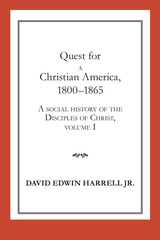
The definitive social history of the Disciples of Christ in the 19th century
The Disciples of Christ, led by reformers such as Alexander Campbell and Barton W. Stone, was one of a number of early-19th-century primitivist religious movements seeking to “restore the ancient order of things.” The Disciples movement was little more than a loose collection of independent congregations until the middle of the 19th century, but by 1900 three clear groupings of churches had appeared. Today, more than 5 million Americans—members of the modern-day Disciples of Christ (Christian Church), Independent Christian Churches, and Churches of Christ, among others—trace their religious heritage to this “Restoration Movement.”
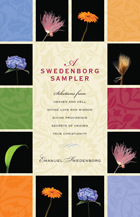
Swedish scientist and theologian Emanuel Swedenborg wrote volumes upon volumes based on the understanding he gained through visits to the spiritual world and from conversations with its inhabitants. For new readers of Swedenborg, knowing where to start and what to read can present an insurmountable task. This volume is a good starting point and provides samples of some of his most powerful writings, now available in new, contemporary translations.
What happens to our souls after we die? What is the afterlife like? What is the nature of God? Of evil? What can we do during our lives to help guide us to heaven? What kinds of answers can we find in the Bible? Selections from some of Swedenborg’s most popular works—Heaven and Hell, Divine Love and Wisdom, Divine Providence, Secrets of Heaven, and True Christianity—answer these questions and more.
Ideal for those new to Swedenborg’s theology, A Swedenborg Sampler offers tastes from a rich smorgasbord of spiritual insight.
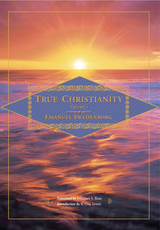
True Christianity presents a satisfying and sensible alternative to mainstream Christianity. The last book published by Swedish scientist-turned-seer Emanuel Swedenborg, it serves as both the keystone in the architecture of his theology and the summary of his far-reaching psychological insights. This volume, the first of two, provides unique answers to humankind’s perennial questions about the nature of God and about Jesus—not only what his purpose was and how he fulfilled it, but why his life and death are still relevant to us now.
This volume features an introduction by R. Guy Erwin of California Lutheran University setting the work in its theological and historical context.
The New Century Edition of the Works of Emanuel Swedenborg is a modern-language, scholarly translation of Swedenborg’s theological works. The series’ easy-to-read style retains the dignity, variety, clarity, and gender-inclusive language of Swedenborg’s original Latin, bringing his thought to life. Introductions and annotations by eminent, international scholars place Swedenborg’s writings in their historical context and illuminate obscure references within the text, enabling readers to understand and trace Swedenborg’s influence as never before.
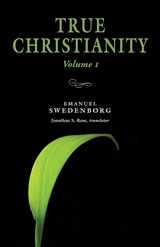
True Christianity presents a satisfying and sensible alternative to mainstream Christianity. The last book published by Swedish scientist-turned-seer Emanuel Swedenborg, it serves as both the keystone in the architecture of his theology and the summary of his far-reaching psychological insights. This volume, the first of two, provides unique answers to humankind’s perennial questions about the nature of God and about Jesus—not only what his purpose was and how he fulfilled it, but why his life and death are still relevant to us now.
The New Century Edition of the Works of Emanuel Swedenborg is a modern-language, scholarly translation of Swedenborg’s theological works. The series’ easy-to-read style retains the dignity, variety, clarity, and gender-inclusive language of Swedenborg’s original Latin, bringing his thought to life.
This portable edition contains the full text of the New Century Edition translation, but not the introduction, annotations, or other supplemental materials found in the deluxe edition.
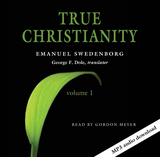
True Christianity presents a satisfying and sensible alternative to mainstream Christianity. The last book published by Swedish scientist-turned-seer Emanuel Swedenborg, it serves as both the keystone in the architecture of his theology and the summary of his far-reaching psychological insights. This volume, the first of two, provides unique answers to humankind’s perennial questions about the nature of God and about Jesus—not only what his purpose was and how he fulfilled it, but why his life and death are still relevant to us now.
The New Century Edition of the Works of Emanuel Swedenborg is a modern-language, scholarly translation of Swedenborg’s theological works. The series’ easy-to-read style retains the dignity, variety, clarity, and gender-inclusive language of Swedenborg’s original Latin, bringing his thought to life.
This portable edition contains the full text of the New Century Edition translation, but not the introduction, annotations, or other supplemental materials found in the deluxe edition.
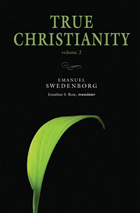
In the final years of his life, Emanuel Swedenborg wrote True Christianity, an opus that served both to contextualize his theology within contemporary Christianity and to serve as a road map for the new spiritual age that would follow. This second volume covers topics such as freedom of choice, repentance, the transformation of a person’s inner being during spiritual awakening, the rites of baptism and the Holy Supper (communion), and the second coming of the Lord.
This new translation is part of the New Century Edition of the Works of Emanuel Swedenborg, an ongoing project to render Swedenborg’s theological works in clear, contemporary language that reflects the simple and engaging style of the original Latin. The portable edition contains the text of the New Century Edition translation, but not the annotations or other supplementary materials found in the deluxe edition.
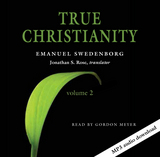
In the final years of his life, Emanuel Swedenborg wrote True Christianity, an opus that served both to contextualize his theology within contemporary Christianity and to serve as a road map for the new spiritual age that would follow. This second volume covers topics such as freedom of choice, repentance, the transformation of a person’s inner being during spiritual awakening, the rites of baptism and the Holy Supper (communion), and the second coming of the Lord.
This new translation is part of the New Century Edition of the Works of Emanuel Swedenborg, an ongoing project to render Swedenborg’s theological works in clear, contemporary language that reflects the simple and engaging style of the original Latin. The portable edition contains the text of the New Century Edition translation, but not the annotations or other supplementary materials found in the deluxe edition.

READERS
Browse our collection.
PUBLISHERS
See BiblioVault's publisher services.
STUDENT SERVICES
Files for college accessibility offices.
UChicago Accessibility Resources
home | accessibility | search | about | contact us
BiblioVault ® 2001 - 2024
The University of Chicago Press









